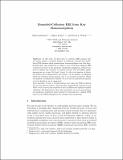Bounded-Collusion IBE from Key Homomorphism
Author(s)
Goldwasser, Shafi; Lewko, Allison; Wilson, David A.
DownloadGoldwasser_Bounded-collusion.pdf (146.6Kb)
OPEN_ACCESS_POLICY
Open Access Policy
Creative Commons Attribution-Noncommercial-Share Alike
Terms of use
Metadata
Show full item recordAbstract
In this work, we show how to construct IBE schemes that are secure against a bounded number of collusions, starting with underlying PKE schemes which possess linear homomorphisms over their keys. In particular, this enables us to exhibit a new (bounded-collusion) IBE construction based on the quadratic residuosity assumption, without any need to assume the existence of random oracles. The new IBE’s public parameters are of size O(tλlogI) where I is the total number of identities which can be supported by the system, t is the number of collusions which the system is secure against, and λ is a security parameter. While the number of collusions is bounded, we note that an exponential number of total identities can be supported.
More generally, we give a transformation that takes any PKE satisfying Linear Key Homomorphism, Identity Map Compatibility, and the Linear Hash Proof Property and translates it into an IBE secure against bounded collusions. We demonstrate that these properties are more general than our quadratic residuosity-based scheme by showing how a simple PKE based on the DDH assumption also satisfies these properties.
Date issued
2012-03Department
Massachusetts Institute of Technology. Computer Science and Artificial Intelligence Laboratory; Massachusetts Institute of Technology. Department of Electrical Engineering and Computer ScienceJournal
Theory of Cryptography
Publisher
Springer-Verlag
Citation
Goldwasser, Shafi, Allison Lewko, and David A. Wilson. “Bounded-Collusion IBE from Key Homomorphism.” Theory of Cryptography (2012): 564–581.
Version: Author's final manuscript
ISBN
978-3-642-28913-2
978-3-642-28914-9
ISSN
0302-9743
1611-3349